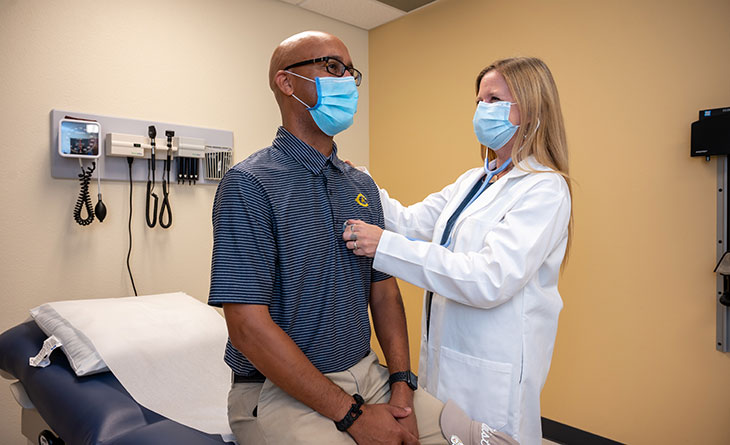Primary Care Provider: Your Trusted Resource for Healthcare
Primary Care Provider: Your Trusted Resource for Healthcare
Blog Article
Comprehending the Essential Duty of Medical Care in Comprehensive Wellness Monitoring and Condition Avoidance Approaches
The integral function of key care in thorough wellness management and condition prevention strategies can not be overemphasized, as it offers as the foundation for efficient medical care distribution. By focusing on preventative care and fostering enduring patient-provider relationships, primary care professionals are distinctly placed to resolve specific health demands while additionally affecting more comprehensive area health and wellness outcomes.
Definition of Health Care
Although the idea of medical care might vary throughout various health care systems, it fundamentally refers to the very first factor of get in touch with for clients within the medical care continuum. Main treatment includes a broad series of solutions, consisting of precautionary treatment, diagnosis, treatment, and monitoring of persistent conditions. It is defined by its comprehensive, available, and worked with strategy, making sure people receive holistic treatment customized to their individual demands.
Medical care carriers, often family doctors, internists, or pediatricians, play a critical duty in establishing continuous patient-provider partnerships. This connection of treatment fosters trust fund and facilitates better wellness outcomes through regular monitoring and tailored treatments. The focus on a patient-centered approach permits the consideration of social, financial, and psychological variables that affect health.
Moreover, medical care functions as an essential part in browsing the health care system, guiding people with specialized services when necessary. By working as a central center for health and wellness administration, health care not just addresses instant medical concerns yet also highlights the significance of total health and preventative procedures. Therefore, its definition expands past simple therapy to encompass a thorough structure for wellness promotion and disease prevention.
Benefits of Preventive Treatment
Preventative care deals many advantages that dramatically enhance individual and neighborhood health end results. By concentrating on the avoidance of diseases and health and wellness problems prior to they arise, preventive care lowers the incidence of severe health problems, consequently reducing medical care expenses gradually. Early detection via normal testings and assessments permits prompt interventions, which can prevent the development of conditions, causing boosted quality of life for people.
Furthermore, preventative care advertises health and wellness education and recognition, empowering individuals to make enlightened decisions regarding their way of lives and health behaviors. This positive approach encourages regular check-ups, inoculations, and health testings, which not just profit individuals but also add to the general wellness of the community. By minimizing the worry of chronic illness and protecting against episodes of contagious illness, precautionary treatment plays a crucial function in improving public wellness.
Along with enhancing specific wellness end results, precautionary care cultivates a much more reliable medical care system by reducing the need for substantial treatments and hospitalizations. Ultimately, investing in precautionary care is important, as it promotes healthier populaces, lowers health differences, and guarantees better source appropriation within the medical care system.
Function in Persistent Illness Management
The positive techniques employed in precautionary care are important in the monitoring of persistent illness, which frequently require ongoing interest and sources. Health care suppliers play a critical role in this context, acting as the initial point of call for people with persistent conditions such as diabetes, hypertension, and cardiovascular disease. They are critical in establishing individualized management plans that encompass normal surveillance, medication administration, and lifestyle modifications.

Furthermore, medical care service providers often employ modern technology and data analytics to track individual progress and identify prospective complications early. This positive tracking boosts patient involvement and encourages people to take an energetic role in their health management. Ultimately, the integration of health care right into persistent disease monitoring fosters enhanced lifestyle and reduces the burden on health care systems.
Patient-Provider Relationships

In addition, a durable patient-provider rapport boosts person interaction and self-management. Service providers who invest time in recognizing their patients' backgrounds, preferences, and inspirations are much better outfitted to sustain them in managing their conditions. This personalized method can bring about improved health outcomes, as clients are most likely to comply with recommendations when they really feel valued and recognized.
Additionally, continuity of care plays a considerable duty in strengthening these partnerships. Normal interactions in between individuals and service providers help with continuous analysis and changes to therapy strategies, which is critical for taking care of chronic illness effectively. This connection not just promotes better health end results yet additionally lowers medical care prices by minimizing the demand for urgent treatments.
Effect on Neighborhood Health
Strong patient-provider partnerships substantially influence area health and wellness end results, as they add to a more involved and educated population. pcp near me. When individuals really feel linked to their health care companies, they are more most likely to look for preventative services, adhere to therapy strategies, and take part in health-promoting habits. This involvement fosters a society of health, where people prioritize their wellness and the well-being of their neighborhood
Furthermore, efficient interaction between people and carriers enhances wellness proficiency, encouraging individuals to make informed choices concerning their care. This enhanced understanding can cause lowered rates of persistent conditions, as people come to be aggressive in managing their health and wellness. Additionally, strong relationships facilitate the identification of community-specific health obstacles, making it possible for look what i found suppliers to customize treatments that address neighborhood demands.
In addition, medical care serves as an important accessibility factor for health and wellness sources, attaching clients with essential solutions and support networks. This detailed technique not just boosts specific health and wellness however also enhances community communication, as locals function collaboratively to address wellness differences. In general, the effect of durable patient-provider relationships extends beyond the facility, promoting healthier neighborhoods and contributing to a lasting health care system.
Final Thought
In summary, key treatment is essential to reliable health administration and disease avoidance. By highlighting preventative treatment and chronic condition administration, main treatment helps with very early discovery and customized therapy plans. Solid patient-provider relationships foster trust and enhance adherence to wellness referrals. Inevitably, the assimilation of medical care into neighborhood health and wellness methods leads to boosted wellness end results and lowered medical care expenses, highlighting its important role in promoting overall community wellness.
Report this page